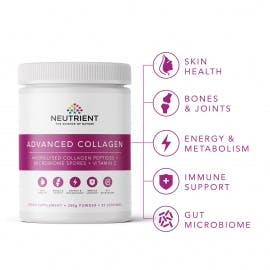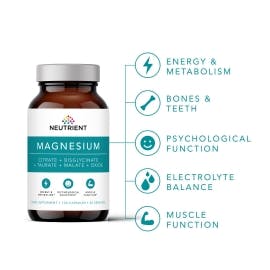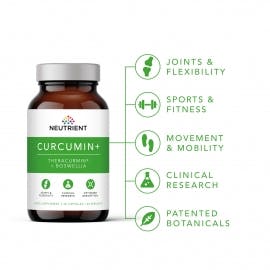Injury Prevention & Muscle Recovery: 6 Essential Tips for Staying Active & Strong
As we step into a new year, many people are looking to get back into fitness—whether it's to feel stronger, improve energy levels, or simply maintain a healthy, active lifestyle. But jumping into intense workouts without the right strategy can lead to sore muscles, joint strain, or even injury.
To build strength, improve endurance, and recover effectively, it’s important to take a balanced approach. Here’s how to support your body, prevent injuries, and make your fitness journey sustainable.
Why Recovery Matters
Any form of physical activity—whether it's a gym session, yoga, or long walks—places a demand on the body. Muscles, joints, and even the immune system need time to repair and rebuild. Overtraining without proper recovery can lead to:
✅ Muscle Strain & Joint Pain – Intensive or high-impact exercise can cause inflammation and slow down muscle repair.
✅ Oxidative Stress – Exercise increases oxygen use, which can generate free radicals. If not balanced with antioxidants, this can contribute to fatigue and muscle soreness.
✅ Weakened Immunity – Studies show that overtraining without adequate rest can temporarily lower immune function, making the body more vulnerable to colds and fatigue.
The good news? A few simple habits can make a huge difference in keeping you strong, injury-free, and energized.
1. Nourish Your Body for Strength & Recovery
The right nutrition isn’t just about fueling workouts—it’s key for muscle repair, joint health, and overall well-being.
Protein for Muscle Repair
Protein helps rebuild muscle fibers after exercise. Include a variety of protein sources like:
✔️ Lean meats, fish, and eggs
✔️ Lentils, chickpeas, and tofu
✔️ Greek yogurt and cottage cheese
✔️ Collagen powder (great for soups and casseroles!)
Check out Neutrient Advanced Collagen
Nutrients That Support Recovery
For optimal energy and recovery, focus on:
✔️ Magnesium-rich foods – Leafy greens, nuts, seeds, and whole grains help relax muscles and prevent cramps.
✔️ Healthy carbohydrates – Swap white bread and pasta for wholegrain options like brown rice and sprouted wholemeal bread to maintain steady energy levels.
✔️ Antioxidants – Vitamin C (from berries, citrus, and bell peppers) and zinc (from seeds, nuts, and seafood) help counteract oxidative stress and support immunity.
Don’t Fear Healthy Fats
Fats are essential for cell stability, brain health, and hormone balance. Instead of cutting them out, focus on:
✔️ Coconut oil – A source of MCTs (medium-chain triglycerides), which provide quick energy and support metabolism.
✔️ Omega-3s – Found in oily fish, walnuts, and flaxseeds, these help reduce inflammation and muscle soreness after workouts.
2. Use Natural Anti-Inflammatory Herbs & Spices
Adding powerful natural ingredients to your daily routine can help ease muscle soreness and support joint health:
✔️ Curcumin – A well-researched compound found in turmeric, curcumin has potent anti-inflammatory properties that support muscle recovery. Consider adding turmeric to smoothies or curries, or taking a high-quality supplement.
✔️ Boswellia Serrata – Also known as Indian frankincense, this herb is often used to support joint comfort and mobility.
✔️ Ginger – Well-known for its digestion benefits, ginger also helps with joint stiffness and post-exercise muscle recovery.
3. Find the Right Balance in Your Workouts
Building strength and endurance takes consistency, not intensity. Overtraining can lead to burnout or injury, so listen to your body:
✔️ Start with moderate workouts 3–4 times a week and gradually increase intensity.
✔️ Mix aerobic exercise (like walking, cycling, or swimming) with strength training to support both cardiovascular health and muscle tone.
✔️ Pay attention to how your body feels—fatigue, soreness, or joint discomfort are signs you may need to adjust your routine.
4. Prioritize Rest & Recovery
Muscles don’t grow during workouts—they grow during rest. Giving your body time to recover is just as important as exercising.
✔️ Sleep deeply – Quality sleep is when the body produces growth hormone, essential for muscle repair. Aim for 7–9 hours per night.
✔️ Take rest days – Schedule at least one or two rest days per week to allow muscles to rebuild and prevent injury.
✔️ Try active recovery – Light activities like stretching, yoga, or leisurely walks can keep the body moving without overloading it.
5. Stay Hydrated for Peak Performance
Even mild dehydration can reduce workout performance, cause fatigue, and delay recovery. To stay hydrated:
✔️ Drink consistently – Don’t wait until you feel thirsty. Sip water throughout the day.
✔️ Replenish after workouts – After sweating, consider an electrolyte-rich drink (especially if exercising for over an hour).
✔️ Hydrating foods help too – Cucumbers, watermelon, oranges, and soups provide extra hydration.
6. Tune In & Listen to Your Body
Fitness isn’t just about pushing limits—it’s about long-term well-being. If you notice:
❌ Lingering soreness that lasts over a week
❌ Persistent fatigue despite rest
❌ Joint pain or inflammation
It may be time to adjust your routine, focus on recovery, or seek expert advice. Your fitness journey should be sustainable, energizing, and empowering!
Final Thoughts
By balancing exercise, proper nutrition, rest, and recovery strategies, you can stay active, strong, and injury-free. Whether you're starting a new fitness routine or looking to refine your approach, these simple yet effective habits will support your long-term health and vitality.
Written by: Jacqueline Newson BSc (Hons) Nutritional Therapy
Editor: Alejandra Toro, Pshychologist, MSc Nutrition and Behaviour
REFERENCES
- Jonathan M. Peake, Oliver Neubauer, Paul A. Della Gatta, and Kazunori Nosaka. Muscle damage and inflammation during recovery from exercise. Journal of Applied Physiology 2017 122:3, 559-570. doi:10.1152/japplphysiol.00971.2016.
- Daniel Vasile, P. R., et al. (2024). Evaluation of curcumin intake in reducing exercise-induced muscle damage in athletes: a systematic review. Journal of the International Society of Sports Nutrition. doi.org/10.1080/15502783.2024.2434217.
- Majeed A, Majeed S, Satish G, Manjunatha R, Rabbani SN, Patil NVP, Mundkur L. A standardized Boswellia serrata extract shows improvements in knee osteoarthritis within five days-a double-blind, randomized, three-arm, parallel-group, multi-center, placebo-controlled trial. Front Pharmacol. 2024 Jul 18;15:1428440. doi: 10.3389/fphar.2024.1428440. PMID: 39092235; PMCID: PMC11291344.
- Altman RD, Marcussen KC. Effects of a ginger extract on knee pain in patients with osteoarthritis. Arthritis Rheum. 2001 Nov;44(11):2531-8. doi: 10.1002/1529-0131(200111)44:11<2531::aid-art433>3.0.co;2-j. PMID: 11710709.




.jpg?auto=format&q=45&w=262&trim=auto)
.jpg?auto=format&q=45&w=262&trim=auto)
